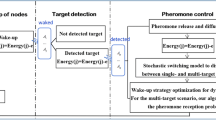Abstract
Energy-efficiency is an issue that needs to be considered while designing a scheme for target tracking. The purpose of this paper is to propose a scheme for target tracking that mitigates the power consumption. The proposed scheme consists of a dynamic leadership delegation based activation algorithm for efficient target tracking. A dynamic activation range for awaking sensors in the neighborhood of the target is used depending on its speed. The effectiveness of the proposed scheme is analysed through extensive simulations. The performance of the proposed approach is observed to be better than the existing approaches in terms of the accuracy of tracking and the amount of power consumption.







Similar content being viewed by others
References
Abbas AM (2020) Analysis of error for anchor-based localization in wireless sensor networks. J Interdiscip Math 23(2):393–401
Ahmad T, Abbas AM (2020) EEAC: an energy efficient adaptive cluster based target tracking in wireless sensor networks. J Interdiscip Math 23(2):379–392
Alshamaa D, Mourad-Chehade F, Honeine P (2018) Tracking of mobile sensors using belief functions in indoor wireless networks. IEEE Sens J 18(1):310–319
Atia GK, Veeravalli VV, Fuemmeler JA (2011) Sensor scheduling for energy-efficient target tracking in sensor networks. IEEE Trans Signal Process 59(10):4923–4937
Darabkh KA, Albtoush WY, Jafar IF (2017) Improved clustering algorithms for target tracking in wireless sensor networks. J Supercomput 73:1952–1977
Foderaro G, Zhu P, Wei H, Wettergren TA, Ferrari S (2018) Distributed optimal control of sensor networks for dynamic target tracking. IEEE Trans Control Netw Syst 5(1):142–153
Fuemmeler JA, Atia GK, Veeravalli VV (2011) Sleep control for tracking in sensor networks. IEEE Trans Signal Process 59(9):4354–4366
Fuemmeler JA, Veeravalli VV (2008) Smart sleeping policies for energy efficient tracking in sensor networks. IEEE Trans Signal Process 56(5):2091–2101
Jiang B, Ravindran B, Cho H (2013) Probability-based prediction and sleep scheduling for energy-efficient target tracking in sensor networks. IEEE Trans Mob Comput 12(4):735–747
Luo J, Zhang Z, Liu C, Luo H (2018) Reliable and cooperative target tracking based on WSN and WiFi in indoor wireless networks. IEEE Access 6:24846–24855
Mahboubi H, Masoudimansour W, Aghdam AG, Sayrafian-Pour K (2017) An energy-efficient target-tracking strategy for mobile sensor networks. IEEE Trans Cybern 47(2):511–523
Mini S, Udgata SK, Sabat SL (2014) Sensor deployment and scheduling for target coverage problem in wireless sensor networks. IEEE Sens J 14(3):636–644
Qi Y, Cheng P, Bai J, Chen J, Guenard A, Song Y, Shi Z (2016) Energy-efficient target tracking by mobile sensors with limited sensing range. IEEE Trans Ind Electron 63(11):6949–6961
Selma B, Chouraqui S, Abouassa H (2020) Optimal trajectory tracking control of unmanned aerial vehicle using ANFIS-IPSO system. Int J Inf Technol 12:383–395
Sweidan HI, Havens TC (2018) Sensor relocation for improved target tracking. IET Wirel Sens Syst 8(2):76–86
Wang X, Fu M, Zhang H (2012) Target tracking in wireless sensor networks based on the combination of KF and MLE using distance measurements. IEEE Trans Mob Comput 11(4):567–576
Wang X, Ma J, Wang S, Bi D (2010) Distributed energy optimization for target tracking in wireless sensor networks. IEEE Trans Mob Comput 9(1):73–86
Wei-Peng C, Hou JC, Lui S (2004) Dynamic clustering for acoustic target tracking in wireless sensor networks. IEEE Trans Mob Comput 3(3):258–271
Wu B, Feng Y, Zheng H, Chen X (2016) Dynamic cluster members scheduling for target tracking in sensor networks. IEEE Sens J 16(19):7242–7249
Yang X, Zhang W, Chen MZQ, Yu L (2017) Hybrid sequential fusion estimation for asynchronous sensor network-based target tracking. IEEE Trans Control Syst Technol 25(2):669–676
Yasin JN, Mohamed SAS, Haghbayan MH, Heikkonen J, Tenhunen H, Plosila J (2020) Low-cost ultrasonic based object detection and collision avoidance method for autonomous robots. Int J Inf Technol. https://doi.org/10.1007/s41870-020-00513-w
Author information
Authors and Affiliations
Corresponding author
Rights and permissions
About this article
Cite this article
Ahmad, T., Abbas, A.M. LeDA: leadership delegation based activation scheme for target tracking in wireless sensor networks. Int. j. inf. tecnol. 13, 541–549 (2021). https://doi.org/10.1007/s41870-021-00616-y
Received:
Accepted:
Published:
Issue Date:
DOI: https://doi.org/10.1007/s41870-021-00616-y




